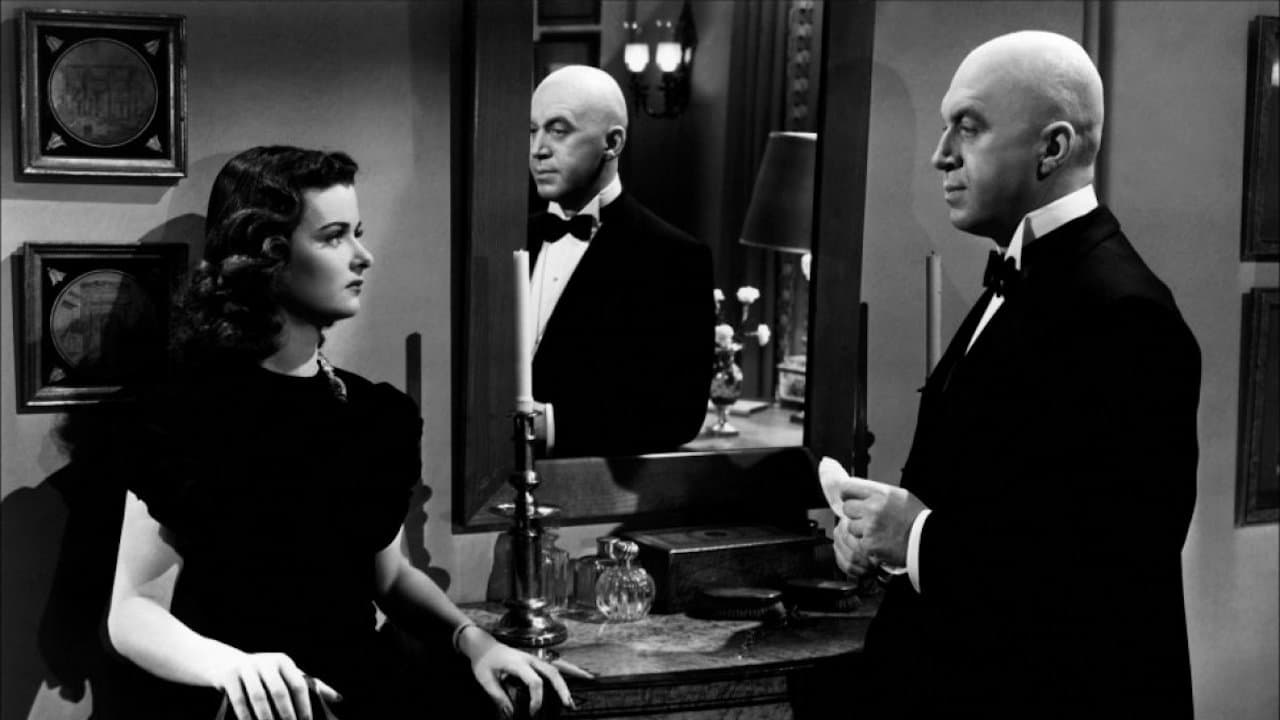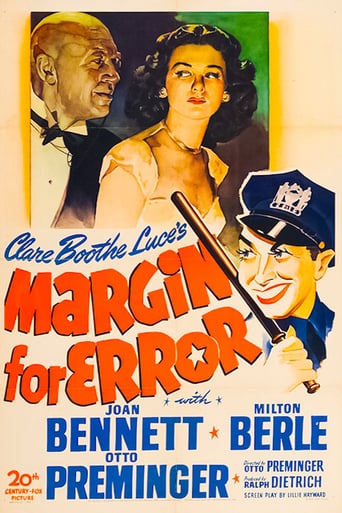Matrixston
Wow! Such a good movie.
Linbeymusol
Wonderful character development!
Greenes
Please don't spend money on this.
Myron Clemons
A film of deceptively outspoken contemporary relevance, this is cinema at its most alert, alarming and alive.
bkoganbing
In order to bring this to the screen in 1943 Margin For Error had to be told in flashback. So it was by star Milton Berle as he relates to his fellow GIs his and Carl Esmond's story as they are about to hit a beach.Margin For Error which was written by Clare Booth Luce had a run of 264 performances on Broadway during the 1939-40 season. Only Otto Preminger as the sadistic Nazi consul in New York before FDR broke diplomatic relationship with them and star of the story and Edward McNamara playing a police captain repeat their roles from Broadway.Milton Berle takes the place of Sam Levene playing New York City policeman Moe Finkelstein who draws from McNamara the unenviable task of guarding the Third Reich embassy in New York. Can you imagine that in New York there are a sizable number of people not happy with the doctrines of the Third Reich, a lot of them with names like Finkelstein? Still Berle does his duty and at the same time is in a position to foil a few Nazi schemes.Otto Preminger is looking like he's loving playing the villain here, a man without a single redeeming feature you can name. He's even stealing from the Third Reich because he has a nasty gambling habit which ultimately brings him down. He's married to Joan Bennett whose mother was American although she's in love with the embassy's secretary Carl Esmond.Howard Freeman is in the cast as the leader of the American Bund in a characterization a whole lot like Fritz Kuhn. Kuhn had ambitions to be America's Hitler, but he was a bungler and a clod and just didn't have the right stuff. Still he was what later would be termed a useful idiot, but even Freeman's not putting up with Preminger for too much longer.Watching Berle in another feature from 20th Century Fox it becomes even more abundantly clear that Darryl Zanuck saw in him a comedy star who could be as bankable at the box office as Bob Hope was with Paramount. He was certainly more convincing in this instant as a Jew than Hope would have been, but the lines and situations were pure Hope.Margin For Error still holds up well as a World War II era item than a whole lot of others do.
dbdumonteil
It's just a joy to see Moe Finkelstein,a modest cop ,give lessons in democracy to a consul (the director/actor) and to a German of high birth,a baron !It was a propaganda movie ,but it did not repeat parrot(!) fashion Preminger's peers ' errors (!).Actually the purpose of the movie was to denounce Nazis and it pulls it off with gusto ,thanks to Milton Berle's naive but effective common sense .He probably never read "Tristan Und Isolde" but he knows that his country is the country where you enjoy freedom of expression.The movie cannot be ranked among Preminger's finest works,by a long shot ,but its construction (a long flashback) is a good way to show that all the Germans are not evil when the cop (now a soldier)stands up for his noble friend .There's also a murder mystery a la Agatha Christie a bit far fetched but rather smart. Fine acting,particularly by Joan Benett and Milton Berle.Preminger's character is a bit caricatured.
theowinthrop
I saw this odd "comedy" in the early 1970s when I was at college. It is not a great comedy - barely a passingly good comedy. But it has a situation in it that is still somewhat relevant, even if the characters have changed.The issue is: if you know a foreign government is evil and hates your country, your country's governmental philosophy, and most of the people in your country, how can you formally protect its representatives when they are under diplomatic title?Claire Booth Luce wrote one of the best comedies of the 1930s, "The Women", which was turned into a memorable film comedy with Joan Crawford, Norma Shearer, Rosalind Russell, Joan Fontaine, Paulette Goddard, and Mary Boland. As the film's advertisements said, "It is "The Women", and it's all about Men!!!", as the film is about the way women manipulate and fight over men. Despite some dating due to social changes (the social set is centered on the "gold coast" of Long Island) it still can be revived on stage - and has been in the last three years successfully.Not so with "Margin For Error". Ms Luce, like her husband Henry (the publisher of "Time" and "Newseek" and "Life Magazine"), was a mixture of good and bad ideas. The bad ones included a snobby anti-Semitism that arose from time to time. Alexander King once pointed out that every time TIME mentioned Leo Trotsky, Luce would have "(nee Bronstein)" after Trotsky's name. But Luce and his wife were aware of the real threat of Hitler's type of anti-Semitism. They were therefore aware that while they disdained social contact with Jews (and definitely disliked left wing Jews) they would not plan to kill every Jew. It never crossed their minds, of course, that the Hitler style of anti-Semitism was aided by the Luce style of it.Fiorello LaGuardia, known as New York's greatest Mayor, is recalled as our first Italian American Mayor. But his mother was of Hungarian Jewish ancestry. LaGuardia was therefore half-Jewish. He resented Hitler's anti-Semitism, and in the 1930s, while Fritz Kuhn led the American Bundists in Yorkville (in Manhattan), LaGuardia purposely put Jewish-American cops in front of the German consulate to "protect it". They did, as a matter of fact, as LaGuardia realized that the presence of the Jewish cops was a provoking insult to the Nazis.Claire Luce was aware of this, and it is the basis of "Margin For Error". The consulate of the Nazis, headed by arch Nazi Karl Baumer (Otto Preminger), is a center of spying against the U.S.A., and of third column work by Bundists. Baumer is married to Sophia (Joan Bennett) who is carrying on an affair with his secretary Baron Max von Envenstor (Carl Esmond). The Bundist leader is Otto Horst (Howard Freeman - doing a watered down version of his "Himmler" performance in "Hitler's Madman"). Baumer is not lovable at all (which explains his wife's affair). He is thoroughly involved with destroying the U.S.A. for his masters in Berlin. He is also aware that Horst (who has dreams of becoming America's "Fuhrer", like Kuhn did) has been dipping his hands into the till of the Bund. After a particularly nasty incident involving anti-Semitic comments, Baumer is sent word from City Hall that there will be a new police officer protecting the consulate. Enter Officer Moe Finklestein (Milton Berle). Baumer of course is absolutely furious at this individual being "given" to him for protection. Since Finklestein is not a German national or ally, he returns the comments that Baumer shoots at him with interest. As you can see the play has many plot lines in it - perhaps too many. The crisis comes when there is a confrontation scene involving Baumer with his wife and his Secretary, and Horst, and Finklestein within earshot. Baumer has his own agenda, including framing Finklestein in an attempt on Baumer's own life to give a reason for Germany to break off diplomatic relations. But in the course of the confrontations, which occurs during an evening where there is a power failure, Baumer is found dead in his study with knife wounds in his body. Who is responsible?While it may seem somewhat interesting the film moves too slowly. It is best served by Preminger (as several reviewers point out) who makes himself at home as the charismatic but evil diplomat. Freeman adds to it, playing Horst as an ambitious but rather fatuous type (his bund uniform looks a size too small for his plump form). Bennett has had far better roles in other films - this is not in her top 20 films. Esmond is adequate. As for Berle, he really never got into the swing of film acting until after his success as a television pioneer. He'd prefer being remembered for "It's A Mad Mad Mad Mad World" and "Who's Minding The Mint" than for this film. Even his sleazy film agent in "The Oscar" was a surer performance. But then his material is not great.Yet for a minor film "Margin For Error" remains on one's mind. Whenever we have an incident where a country's diplomats (Cuban, or North Korean, or Libyan, or Iranian) have insulted our population or segments of it, and then insisted on protection for the same diplomats in their work, we have to grit our teeth and do it. We are not handing Nazi German diplomats anymore, but the central issue at the heart of the plot remains with us to annoy us.
JohnHowardReid
Preminger also starred and directed the stage play which ran highly successful seasons both on Broadway (264 performances) and the West Coast, so he was a natural for the movie version. Unfortunately, the play is more than a trifle dated, unlike Mrs Luce's other huge stage success, The Women, which is still pointed and amusing even today. By contrast, the women in Margin for Error are not the least bitchy, feline or self-indulgent. Instead, the comedy (such as it is) centers on the efforts of a Jewish cop to come to terms with his duties at the German consulate. He smiles a lot, wins the heart of a serving girl (the lovely Leisl Handl) and has plenty to say and do, but Milton Berle's interpretation never strikes me as either the slightest bit policeman-like or true-to-life. Otto Preminger's portrait of the evil consul is equally one-dimensional, but at least he gives the role presence and charisma. While Preminger rivets attention, Berle is just plain dish-washy. Admittedly, the plot is full of holes, and the other police officers are likewise ridiculously simple-minded. Thank goodness the rest of the cast are better served by the script, particularly Howard Freeman in his best role ever as the strutting, cowardly Mussolini-like bund leader; dashing Carl Esmond as the secretary; and beautiful Joan Bennett as the wife. Production values, led by Cronjager's velvety photography and Day's appealing sets, impress

